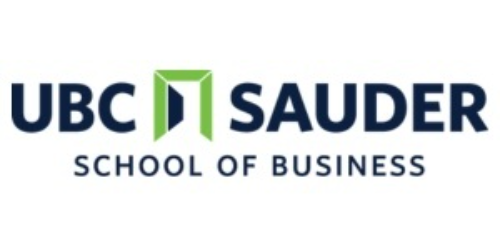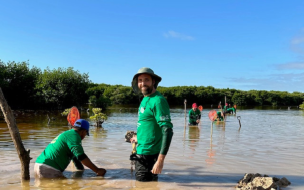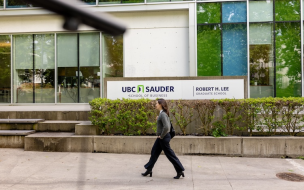Business school provides the ideal environment to enhance these skills, filling in gaps in experience and helping students grow into the kind of business leaders that organizations need today.
At experiential business schools such as UBC Sauder School of Business, hands-on learning shapes many aspects of the student experience.
From consulting on global business projects to sharpening analytical skills in case competitions, these opportunities enhance career readiness for graduates across the UBC Master of Business Administration (UBC MBA), Master of Management (UBC MM), and Master of Business Analytics (UBC MBAN) programs.
Here's what you can expect to gain from studying at an experiential business school.
1. Solve real-world business problems
Effective problem-solving in business is as much about understanding people as it is about data.
At UBC Sauder, students across programs develop these skills through a range of practical opportunities, from in-class problem-solving tasks to consulting projects and ‘Google hackathons’.
Through the Community Business Project (CBP), UBC MM students work with non-profits and social enterprises, leveraging their business knowledge to solve pressing challenges.
For UBC Master of Management graduate Alexandra Salazar Parraguez (pictured), the CBP offered her first taste of consulting.

“I had no consulting experience before this,” she says. “The CBP gave me the chance to work in a hands-on environment and work on real-life challenges to help clients.”
For Alexandra, her experience gave her a clearer sense of what mattered most to her career.
“The most fulfilling part was knowing that what we did helped her business grow. It was one of the most life-changing experiences of my MM journey,” she says.
On the technical side, students in the UBC MBAN program build real-world data analytics expertise through initiatives such as the Google Hackathon.
Run in partnership with Google Cloud, the Hackathon challenges teams to find solutions to complex business problems using data sets and advanced analytics tools—all within a 72-hour timeline.
Students then pitch their recommendations to Google Cloud representatives and industry experts, learning how to work together as a team, develop a solution, and confidently present their ideas to a panel of judges within a short period of time.
“The Google representatives and UBC Sauder team were extremely supportive throughout the entire experience. Learning directly from Google Cloud about how they use data in the field was invaluable,” says Kuhu Puranik, UBC MBAN student.
2. Gain a global business perspective and expand your network
For future business leaders, international experience builds the cultural fluency and market awareness required to grow and lead in a global economy.
At UBC Sauder, MBA students cultivate this mindset through immersive international experiences such as the Global Network for Advanced Management (GNAM) and the Global Immersion Experience (GIE).
These programs offer UBC MBA students the opportunity to learn about business challenges in entirely new contexts, while building an international business network.

As Canada’s only member of GNAM—a partnership of more than 30 leading business schools worldwide—UBC Sauder gives MBA students access to one-of-a-kind experiences such as Global Network Weeks.
These short-term exchanges enable students to study abroad, visit local businesses, and collaborate with peers from other schools on real-world case studies.
UBC MBA graduate Irene Wang (pictured) found that participating in GNAM enabled her to explore a completely different business landscape.

“Returning to Shanghai after 10 years, I gained firsthand insight into how business operations differ in mainland China. This exposure prepared me mentally for the effort required to navigate cultural differences in a professional setting,” she says.
While GNAM opens doors to global collaboration, the GIE takes this further by immersing students in international business challenges. Over two weeks, UBC MBA students travel abroad to consult for a company, bringing their business knowledge to unfamiliar markets.
During her GIE in Singapore, Irene worked with a local company to develop an inventory optimization framework.
“We conducted extensive research on our client’s industry since it was unfamiliar to us and attended training sessions hosted by the client to deepen our understanding of their challenges,” she says.
Beyond building her technical skills, Irene found that UBC Sauder’s experiential opportunities also helped her cultivate a meaningful professional network.

“The program allowed me to form closer bonds with my classmates. These relationships, built on mutual trust and shared experiences, will undoubtedly benefit me both personally and professionally in the years to come,” she says.
3. Accelerate your career readiness and employability
The transition from business school to the workplace can be daunting, but hands-on learning can help to prepare students for the realities of the modern workplace.
Alexandra and Irene found that direct involvement with organizations while studying at UBC Sauder helped them cultivate essential skills for the workplace.
For Alexandra, the collaborative nature of the UBC MM program laid the groundwork for her CBP experience.
“There are a lot of group projects and business cases throughout the UBC MM degree, which helped us develop a strong sense of community with the MM cohort,” she says. “But the CBP developed my time-management skills and taught me the value of collaborating with diverse perspectives to achieve a common goal.”
Similarly for Irene, her GIE experience in Singapore highlighted the importance of adaptability and emotional intelligence for effective collaboration.
“The experience reinforced the importance of keeping an open mind and practicing empathy. Recognizing different perspectives and finding common ground has become an essential part of my approach to business,” says Irene.
The same principles are put to the test in the UBC MBAN Hackathon, which simulates the high-stakes problem-solving of the workplace.
The Hackathon mirrors time-sensitive, complex problems that businesses face daily. Between the Hackathon and internships, students learn how to pivot when their initial approach doesn’t work.
“Working as a team under pressure are skills that are directly transferrable to any workplace,” says Jane Arthurs, associate director of business development at UBC Sauder.









